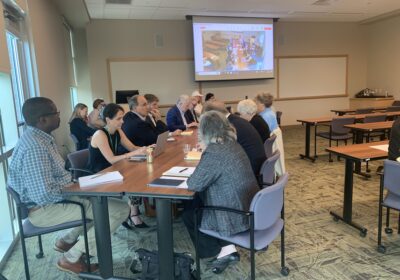Students in support of farmers rights
USF students, volunteers and members of the Coalition of Immokalee Workers (CIW) made their presence known in Tampa’s Hyde Park on Friday, demanding fair treatment for farm workers who pick tomatoes for less than minimum wage.
About 60 to 70 protesters marched two miles to the Publix Greenwise Market at Hyde Park, holding signs and shouting chants to bring awareness to the plight of the state’s tomato industry. Volunteers said the protest was staged because the Lakeland-based grocery chain refuses to pay farm worker’s and enter an agreement for anti-slavery conditions in tomato fields.
Pay farm workers an extra penny for every bucket of tomatoes.
According to the CIW website, seven cases of slavery have been reported in Florida since 1997. The most recent case was tried on January 17, 2008, when a federal grand jury indicted six people in Immokalee, Fla. During the trial, the U.S. Attorney Doug Molloy called the actions of the employers “slavery, plain and simple.”
Captive workers were forced to work full days against their will by their employers through threats and violence, including beatings, shootings and pistol-whippings, according to the website.
However, Shannon Patten, spokeswoman for Publix, said farm worker’s conditions are up to their employers, not the grocery store.
“We do not support any human rights violations and believe that our local, state and federal laws would prohibit such despicable behavior,” Patten said.
She said the grower or the packer sets the price of tomatoes and that Publix pays “whatever the market value is.”
She said Publix sells more than 35,000 different products, thus becoming involved in a labor dispute with a single company opens the door for disputes with thousands of others.
Publix purchases tomatoes from East Coast Growers, which is the company the CIW suggested they use, Patten said.
“(Workers) are asking Publix to intervene in a dispute they have about their working conditions and their pay,” Patten said. “We think they need to go back and settle this between … suppliers and employers, together.”
Gabriella Balsam, a freshman majoring in mass communications, joined the march with a homemade sign that read, “concerned students for a penny more.”
Balsam said she became involved with the CIW through Students for Social Justice, a USF organization that seeks to unite and develop other student organizations dedicated to community service, social justice and activism. Slavery is prevalent in today’s society, Balsam said, and is an injustice she wants to feel responsible for ending.
“It’s such a local issue, and to have this opportunity, obviously, I would take it,” she said.
According to the CIW website, farm workers receive about 1.3 cents per pound of tomatoes. If the workers received one penny more, it would amount to a 75 percent increase in wages.
“Depending on the company you work for that day, you may receive anywhere from 40 to 50 cents for 32 pounds (of tomatoes),” said Heather Vega, organizer for Tampa Bay Fair Food, a partner of CIW. “These are the same wages that they’ve been receiving since 1978,” she said.
When the CIW first formed in 1993, it put pressure on employers for large farm companies to raise wages, but were ineffective, Vega said.
“It was like hitting a brick wall,” she said.
Vega said CIW found that consumers who put pressure on large corporations to set better working conditions for farmers could be the missing force needed to bring about change.
“Over time, if you get a critical mass of people putting pressure on these companies, it starts to become somewhat of a threat,” Vega said. “The tipping point is you don’t want your image to be ruined or … your customers to discontinue buying from you.”
She said labor laws have always been weak for farmers and that, “the industry has not set certain standards or regulations that will protect its workers.”
Vega said, nine companies have agreed to enter into an agreement with CIW that adds one penny to workers wages, investigates and monitors abuse in the fields and stops the exploitation of workers.
Those companies include Taco Bell in 2005, McDonald’s in 2007, Subway, Burger King and Whole Foods in 2008, Bon Apptit Management Co. and Compass Group in 2009 and Aramark and Sodexo in 2010.
Angela Stuesse, an assistant professor of anthropology at USF, said she joined the CIW because consumers should voice their concerns to Publix.
“I think Publix, as a large corporation in the state of Florida, can set a standard for others, and they have a responsibility as a large corporation to lead the way,” she said.






